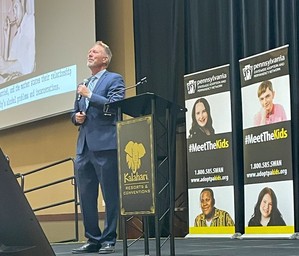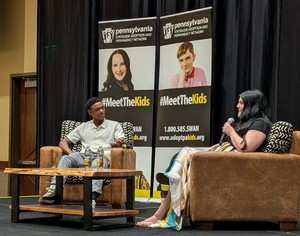2025 PA Permanency Conference: A Celebration of Resilience, Connection, and Unconditional Love
By Hannah Carroll, Communications Specialist
The Annual Pennsylvania Permanency Conference brings together child welfare professionals, families, and advocates to center what matters most: helping children and youth find safe, permanent, loving homes. The 2025 conference opened and closed with two unforgettable keynotes that captured the heart of this mission.
Together, they delivered a clear message: healing is possible, connection is essential, and no child is ever too old to find permanency and belonging.
Opening Keynote: Resilience and Redemption by Derek Clark

The conference kicked off with a powerful talk by Derek Clark. Derek is no stranger to struggle. He entered the foster care system at the age of five with the weight of intergenerational trauma, severe behavioral challenges and labels that followed him like shadows. Diagnosed with everything from cognitive delays to “aretic psychosis” (a made-up term, he later discovered), Derek was labeled “unadoptable.” But what he needed wasn’t correction; it was connection.
Eventually, a foster home on a rural farm became Derek’s refuge. In his new home, he found structure, learned to play music, bonded with animals, and most importantly, experienced unconditional love. His foster parents were teachers who saw beyond his limitations. They gave him creative outlets like clarinet and piano, and they practiced repetition and routine to help rewire his traumatized brain. “By 12, I was a prodigy clarinet player competing against college students,” he said.
Throughout his keynote, Derek challenged the audience to look past behaviors and diagnoses to see the child within. “Every kid is adoptable. Every kid deserves a family. You never give up on a kid.”
Derek reminded the audience that trauma disrupts brain development, but the brain can heal in the right environment. “You can’t think negatively about a child and expect positive outcomes,” he said. “Don’t label them by their worst day. Find their strengths and help them build from there.”
Closing Keynote: Finding Forever by The Karenbauer Family

As the conference came to a close, attendees were invited to hear the story of Darien Karenbauer and his adoptive mom, Maranda Karenbauer. Their story, which was featured in the film Take a Chance on Me by the Archibald Project, is one of disruption, reunion, and ultimately, transformation.
Darien entered foster care at age ten, coming from a situation where his life was often unstable, and he found himself having to care for his younger sisters even though he was a young child himself. While in care, he experienced multiple disrupted placements that left him guarded and disinterested in adoption.
Enter Maranda and Travis Karenbauer, a young couple who had dreamed of fostering before they were even married. At 27, Maranda and Travis met 16-year-old Darien on a Zoom call she described as a job interview—with her nervously “cheesing” and Darien silently staring. But by the end of that call, Maranda and Travis knew they wanted Darien to be part of their family. Darien, for his part, wasn’t quite as sure, but something in him decided to give them a chance anyway.
Darien moved in shortly after. Travis drove from New Castle to Harrisburg to pick him up as soon as he was able because he and Maranda didn’t want him to have to spend another night at the residential facility where he was staying.
He arrived to find a soft bed, warm blankets, and—most exciting of all—an Alexa speaker. “I talked to Alexa all night long,” he laughed. It was the first time he felt like he might actually be able to unpack his things—and maybe, unpack his story too.
The Karenbauers knew that to love Darien was to love all of him. They understood the complexities of trauma, and they prioritized connection when things got hard. Maranda said, “The darkest moments were where we connected the most.”
When adoption came up, it wasn’t easy. After so many disruptions, permanence felt like a myth. But Darien’s adoption was finalized on May 5, 2021.
“I really was owned by the state,” Darien said. “The government was my parents for a minute. Hearing that I was the son of Maranda and Travis—wow. That hit.”
But even after finalization, the trauma lingered. “We had to learn to hold the ‘both,’” Maranda explained. “The joy and the grief. The rewards and the pain.”
Now a father himself, Darien is determined to write a new story for his son Leo. “Now Leo gets to cry at night and have his dad go pick him up,” Darien said. “Leo has a different story than I did.”
Becoming a father pushed Darien to graduate from high school and complete EMT training. He credits his healing not just to his own strength, but to the relationships that showed up for him consistently—his parents, his caseworkers, and the community that believed in him even when he couldn’t believe in himself.
Both Derek Clark and the Karenbauers offered different stories, but one powerful truth: healing from trauma doesn’t happen in isolation. Healing happens through connection.
In a world that too often focuses on what's broken, this year’s keynotes reminded us of what's possible when we choose to see the potential in every child, when we lead with empathy and when we dare to love without conditions.
